Section 15: HEALTH & WELLBEING
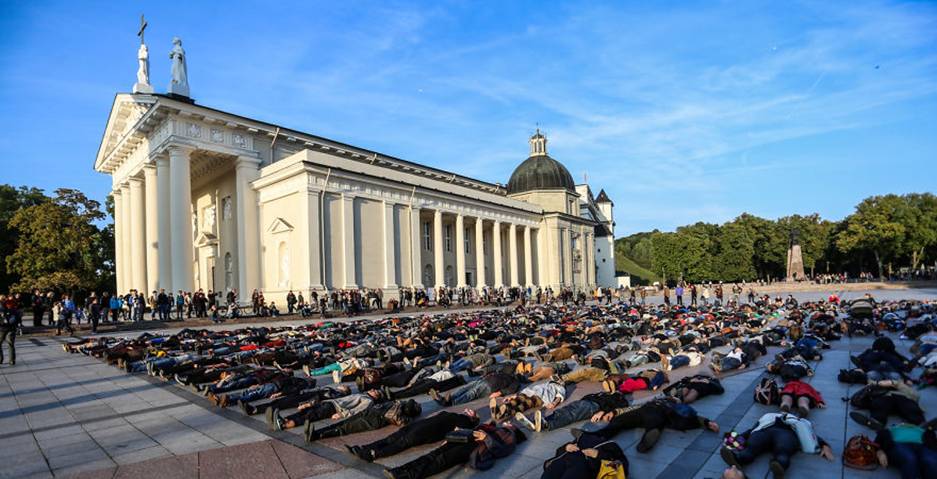

THE VOICE OF INTERNATIONAL LITHUANIA
|
VilNews has its own Google archive! Type a word in the above search box to find any article.
You can also follow us on Facebook. We have two different pages. Click to open and join.
|
Sat, 31st October, 2015 - Posted by - (6) Comment
Love and suicide in Lithuania

ARŪNAS SAKALAUSKAS: I INVITED 1095 PEOPLE TO LIE DOWN IN THE CATHEDRAL SQUARE
OF OUR CAPITAL CITY VILNIUS FOR EVERY SUICIDE MADE LAST YEAR.
Photo: Vladimiras Ivanovas
By Dr. Boris Vytautas Bakunas
A young Lithuanian policeman is found slumped in the seat of his car shot dead, his weapon clutched in one hand – in his other hand his mobile phone containing a text message he had received: “I love another” (report by psychologist Andrius Kaluginas).
According to the World Health Organization, Lithuania now has the highest suicide rate in the world. Psychiatrists, sociologists, and journalists often link Lithuania’s skyrocketing suicide rate to social instability, poverty, high unemployment, and alcoholism.
What has gone largely unnoticed is that one of the leading causes of suicide among people under the age of thirty is unrequited love.…
Wed, 3rd July, 2013 - Posted by - (13) Comment
 By Boris Vytautas Bakunas
By Boris Vytautas Bakunas
It was bitterly cold in Kaunas that December of 2003 during my first visit to the land of my ancestors. Driven by gusts of bone-chilling wind, I sought warmth inside a delicatessen just off Laisves Aleja.
The old woman stood so close to the door that I nearly crashed into her. Snow swirled in behind me like a white cape, sending its flakes towards the last-minute Christmas shoppers inside. Several cast glances at me, and seeing nothing unusual, turned away.
I could barely hear the muttering, hushed tones the old woman spoke...She was so small that I had to bend my head to see her. A frayed white headscarf tightly hugged a wrinkled face – a face battered by at least 70 years of hard living.
Her lips were moving in cadence with her head, which bobbed up and down ever so slightly as if she were saying her rosary. But there were no beads in the cupped hands that stretched towards me. It was then that I understood she was begging.
I had seen beggars before. I remember one legless beggar sitting in child’s little red, steel wagon in front of a dime store in Chicago’s Bridgeport neighborhood where my family moved just as soon as my grandfather found work in the steel mills. No matter how poor we were, my mother always found a quarter to give him, and he always greeted her gleefully when he saw her coming his way.
I fumbled through my pockets finding only a few litai. The old woman took them. Then she humbly clasped my hands in hers. Her hands were old and gnarled like the roots of an ancient oak clutching the earth.
“Dekuj, dekuj,” she muttered, her head bowing in gratitude. “For what?" I wondered. “A few litai?”
A wave of anxiety swept through me. You know that sinking feeling which calls up a memory flash so brief that you forget the details, and all you are left with is cold dread.
Sun, 12th May, 2013 - Posted by - (5) Comment
By Ida Hardy, Texas, USA
Lithuania is my mother’s country. She escaped with her mother and sisters as a young child and at one point in her life she wanted to return. It seemed to me that she heard the whispers from the wind in the forests and they were calling her home. My mother taught us a little about the folk tales and the music. She taught us to meditate and a little bit about yoga and I wanted to learn more about her childhood home. But the Soviets were still reigning and it was impossible for us to go. Later, as we cried on the phone on that day in 1991 I asked her if she would like to return and she said, “You can never go back. Things are changed so much.”
Her message was about more than the structure of her home and the murder of her father. She was really talking about the broken spirits of all the people who were victims, those who were aggressors, and those who were both. There is no going back. No one can undo the evil that has taken place anywhere on the planet throughout time.
 I’m a yoga teacher and natural health practitioner. I learned much of what I know from my mother, and everything else I learned at University. University may have offered more details but I think it all simply confirmed everything she taught about keeping the body healthy. Probably what every mother teaches.
I’m a yoga teacher and natural health practitioner. I learned much of what I know from my mother, and everything else I learned at University. University may have offered more details but I think it all simply confirmed everything she taught about keeping the body healthy. Probably what every mother teaches.Fri, 19th October, 2012 - Posted by - (0) Comment

Guardian angel, by Pietro da Cortona, 1656
Some weekend thoughts
by Irene Simanavicius, Toronto
“Guardian Angels.....ethereal beings who we feel and sometimes see....who snatch us from the brink of disaster and give us subtle advice.....who watch over us while we go about our mundane activities......what a wonderful concept! The concept has been in the supernatural spectrum since ancient times. However, today Angels are inherently a highly religious phenomenon, and the implied concept of Angels is indirect communication with God himself.”
The concept of Guardian Angels has likely been around since the dawn of mankind. It is a concept that has been embraced in some form by virtually every religion since the beginning of religion itself. The modern day depictions of winged beings sitting on clouds and playing harps comes to mind in pretty much all of us when we think of our Guardian Angel, or of Angels in general. In the mainstream psyche, we generally equate Guardian Angels as a spiritual being with our best interests at heart whose purpose is to serve us without interfering with our free will. The modern marketplace solidifies this with angel statuettes, jewelry, wall hangings, plaques and every kind of Angel paraphernalia imaginable at every turn. Classic movies involve Angel themes, most notably in "A Wonderful Life" where an Angel gently shows a mortal man the positive impact he has had on the lives of others, thus turning his own life around.
So what are Guardian Angels? Are they real? Are they figments of our collective imaginations? Are they something in the realm of paranormal like ghosts? Is there any proof that they exist? Are they agents of God? Can we see them? What do they look like? Can we talk to them?
Fri, 5th October, 2012 - Posted by - (11) Comment
By: Dr. Boris Bakunas, M.A., M.Ed, Ph.D.
Fact: In a 2008 poll conducted by Rossiya State television that drew more than 50 million votes, Josef Stalin was chosen as the third most popular figure in Russian history.
Fact: In 2011, Anders Behring Breivik massacred 69 adolescents at a Labor Party youth camp on Utoya Island, Norway shortly after bombing government buildings in Oslo where eight people were killed. Breivik claimed that he was acting in self-defense to protect Norway from an Islamic terrorist takeover.
Fact: Under the shield of the internet, thousands of ultra-nationalists and religious extremists openly espouse mass murder, e.g., “Go into the streets and murder those Russians and Poles, (TheKingdomofGames, 2012), “HOW ABOUT WE KILL MUSLIMS,” (666MikeRochip, 2012), and “Its time to destroy America and capitalism…Soviet union live forever in our hearts!” (KenseiTakesi, 2012).
Tue, 11th September, 2012 - Posted by - (1) Comment

Klaipėda has got a crisis centre for women
that is probably going to be a pioneering
example for such centres worldwide

Text and photos: Aage Myhre
Editor-in-Chief/M.Sc. of Architecture
aage.myhre@VilNews.com
Let me today take you to the new crisis center for women in Klaipeda. The building opened a few days ago, but still there is no furniture and staff in place, hence the centre will be ready to accommodate 'patients' only later in the fall. I myself have been involved in this project for more than three years now, and I wanted to share with you some thoughts on how this center has evolved and today stands out as something rather exceptional, in Lithuania but also on an international scale.
When we started the project, there were three main messages we wanted the center to signal to women who would come here to get help in an emergency situation:
• Here you are in safety
• Here you will find warmth, care and understanding
• Here you will be taken care of by professionals
Thu, 19th July, 2012 - Posted by - (16) Comment

By Aage Myhre, editor-in-chief
aage.myhre@VilNews.com
A new concept for senior apartments, with focus on warmth, dignity and joy. Custom apartments around an outdoor, enclosed patio - plus a large, common 'lobby' for food, reading, music, good talks, therapy, training and more.
Some friends of mine have a large estate just north of Vilnius centre, about 20 minutes drive from the old town and less than five minutes from the Le Meridien Hotel, with its beautiful pool, spa complex, and a great new 18-hole golf course.
The plan they have under consideration right now is to build an elegant senior complex on the site, for potential buyers both in this country and from abroad.
Quality and service will be very high, still at prices one can hardly dream of the United States, Western Europe or Australia.
The planned complex will consist of around 50 apartments and a large public centre-building that can best be compared with an international hotel lobby.
In this 'lobby' one will be met by colorful life as soon as one enters. Dining room, restaurant, cafe, bar, library, piano music, as well as rooms for health, therapy, manicure and sports is that which meets the residents which shall dwell in this totally extraordinary senior complex.
Seniors who buy an apartment here, will in other words not just get a nice place to live, but a total package of food, drinks, activities, care and necessary health care measures in accordance with their own state. Nurses will always be present in the center, and doctors will come here on short notice.

Thu, 21st June, 2012 - Posted by - (9) Comment

I let Giedrė Jotautaitė represent the thousands of beautiful Lithuanian girls and women
who are not only well-formed by nature, but also do their utmost to keep
their bodies in shape through proper diet, moderate use of alcohol and regular exercise.
Many of these girls know very well how to dress and behave, and
they are fully on a par with their male parallels in terms of intelligence and
ability to cope with challenges at work and on a more general basis.
Lithuanian girls are at the very top in the world, in every way!
By Aage Myhre, editor-in-chief
aage.myhre@VilNews.com
I've been back home in Norway for a few days. I chose to drive this time, and travelled via Riga by ferry to Stockholm in Sweden from where I drove on to Oslo in Norway. On the ferry ride back to Riga, I discovered quickly that Swedish high school students filled most of the ship. Graduation was to be celebrated and this was done with good help of huge quantities of cheap Baltic booze aboard the ferry, the whole night through.
I have little against young people dancing the night away in a rollicking party when they have something as big to celebrate as a final exam. However, what frightened me was to see that far more than half of the adolescents were overweight and apparently had done little, in the course of growing up, to keep in shape. Swedish girls who in the 1950s, 60's and 70's were world renowned for their stunning, sexy looks, seem now to have been replaced by fattish, inelegant girls who also do not care much about how they dress or behave. The boys are no better.
What a contrast it was to get back to Vilnius, sit down on a sunny sidewalk café and study the endless stream of beautiful, slim Lithuanian girls who walked by. Like sitting in the front row of the catwalk for a perpetual Miss World show...
Lithuanian girls have good reason to be proud of themselves and the nation of Lithuania has very good reason to be proud of its magnificent girls and women...
I sincerely hope that young girls from Lithuania do not go into the same trap as so many sisters in the west have already done. Obesity, alcohol and unhealthy habits have unfortunately become a hallmark for many young people in Europe of today.
The development is anything but merry, but luckily the girls from Lithuania show the way for those who want to return to the beautiful, healthy feminine ideals...
|
Giedrė is a huge fan of VilNews! |
||
|
Thu, 21st June, 2012 - Posted by - (0) Comment
Overconsumption of alcohol destroys the lives of more and more young people in Europe
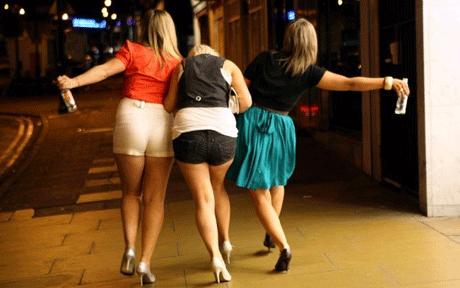
British teenage girls are starting to drink alcohol at the average age of 13,
a new study shows according to The Telegraph. Photo: Christopher Pledger
According to The Telegraph, British researchers have found that today's teenagers start drinking an average of two years younger than women who are now in their mid-twenties did, with most admitting that they had drunk alcohol by the age of 13 or 14.
It is to assume that similar figures apply to many other countries in Europe.
Drinking from a younger age leads teenagers to go on to consume alcohol more heavily, the study also found.
Doctors warn that changes in drinking habits are leading to a rapid rise in the number of young individuals with liver problems.
They say that they are seeing increasing numbers of women in their 20s and 30s with cirrhosis of the liver, a disease virtually unheard of in that age group a decade ago.
A report by a Government watchdog warns that 10 million people in Britain are now drinking at "hazardous" levels.
RELATED ARTICLE
Girls of today are 'stressed, drunk and discriminated against', report finds
Doctors have warned that more people die from alcohol than breast cancer, cervical cancer and MRSA, the hospital superbug, combined.
Fri, 4th May, 2012 - Posted by - (1) Comment
Amrita Nadi: When researching for the Wisdom of Laughter Album (soon coming), I had delight of "meeting" Teresa Hsu, 112 years old, who inspires with her simple messages of joy. "if you love everybody with all the love in your heart, then you’ll be happy, ha, ha, ha,” Below is a wonderful report on her meeting with an audience in 2010, from the blog of Tsem Tulku Rinpoche

Teresa Hsu
By K. Kaewuni Dewi
CENTENARIAN Teresa Hsu kept some 200 people in stitches during her talk on ‘Love All Serve All’ at the Malaysian Buddhist Association hall in Penang last Friday.
For the bubbly Chinese-born Singaporean, who is affectionately known as Singapore’s Mother Teresa, laughter is definitely the best medicine.
Born in 1898, the 112-year-old social worker extraordinaire keeps young and active by happily doing charity work.
Kicking off the question and answer session Hsu said she was born “very, very poor” and the toughest part of her life was when she had to pick grass to eat as she was “very, very hungry”.
“It was at that moment I thought to myself that no one should ever go through what I went through,” she said.
When asked the secret to her longevity and good health, Hsu responded, “Ha, ha, ha! Make sure your heart is always happy”
She also said eating one raw egg every day for breakfast could be another reason for her good health.
“Once someone told me that raw egg is poisonous to which I replied ‘never mind, I thrive on poison’,” she said....
Mon, 26th March, 2012 - Posted by - (2) Comment
 |
Last week we brought an article with the latest statistics from the World Health Organization, showing that Lithuania again is on top when it comes to suicides – with 61,3 men and 10,4 women per 100,000 inhabitants deciding to end their lives this sad way – annually.
Dainius Puras, a Lithuanian psychiatrist, explains how it is the uncertainty and unpredictability of the economic situation that have such a detrimental effect: "People don't like change,” he says, referring to Lithuania’s 20-year period of dramatic social and economic change since the fall of the Soviet Union in 1991”. |
Response from Vijole Arbas in Kaunas:
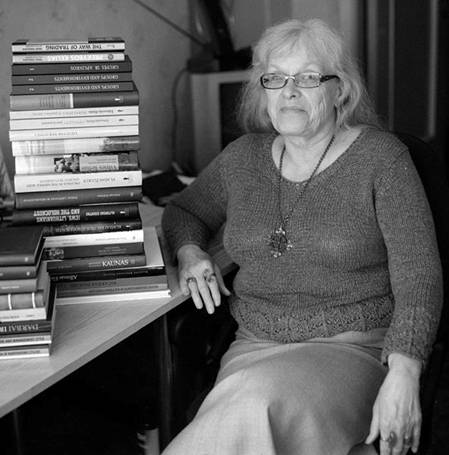
This cannot be the only explanation -- we are plagued by bad spirits of our past, we can't seem to "clean up", to make amends.
Jūratė Sučylaitė wrote a novel (can't recall the exact title Pokalbis su Ragana, somthing like that). Her thesis (if I may call it that) is that our ancestors always whisper in our ears. They beg to be understood. That does not mean to glorify but understand, realize why, forgive, make amends. People want to drown out those voices of the dead by alcoholism, suicide. It is a haunting story that rings very true to me.
On the other hand, the ancestors of American Lithuanians also whisper, also had the sins of betrayal against one's fellow man as well as of victimization. Why don't they hear those ghosts?
A film by V. Landsbergis Jr., When I Was a Partisan, also deals with this sort of concept.
 |
Irene Simanavicius: There is so much more to this...so much more. Those of us that grew up in North America and have visited Lithuania got to know and love people we have met during our visits. People young and old shared some of the stories that were heart wrenching. I agree with Vijole Arbas 100 %. |
Sat, 24th March, 2012 - Posted by - (3) Comment

Latest statistics from the World Health Organization show that Lithuania again is on top when it comes to suicides – with 61,3 men 10,4 women per 100,000 inhabitants deciding to end their lives this sad way – annually.
Dainius Puras, a Lithuanian psychiatrist, explains how it is the uncertainty and unpredictability of the economic situation that have such a detrimental effect: "People don't like change,” he says, referring to Lithuania’s 20-year period of dramatic social and economic change since the fall of the Soviet Union in 1991”.
He describes the reaction to freedom in 1989: "Many people could not manage to cope with this change, with this huge societal stress . . . [they] regressed to destructive or self-destructive behaviour." The stress, he says, prompted an unprecedented crisis of mortality, one that still exists. In Lithuania, with a population of just three million, 5,000 people die every year because of "external causes" - suicide, homicide, violence. He describes it as an epidemic.
Lithuania - a prophetic microcosm of the global crisis?
Puras sees Lithuania's experience as a prophetic microcosm of the global crisis: a society undergoing enormous stress because of the effects of a toxic system, culminating in an “explosion" in the form of a financial crisis. He also points out a strange trend: the more severe the threat to human life, the better societies and individuals seem to fare in their mental health. "History shows that when it is a real crisis like war, or when people are starving, there is a huge decrease in mental health problems, including suicide. During the war you have to survive physically; existential problems are not so important. Suicide is mainly the price we pay for civilisation."
Figures for the UK support his theory - during the First World War, the suicide rate dropped to 8.5 per 100,000. It then leapt to 13.5 in the interwar years, and fell again during the Second World War to 9.2. Immediate, life-threatening crisis, Puras says, creates a sense of purpose: there's not as much time to worry about yourself.
( From an article in “New Statesman”, by Sophie Elmhirst)
Lithuanian Suicide Hotline
Youth Psychological Aid Centre -Vilnius Youth Line
Jaunimo psichologinés paramos centras
Rasu g.20, LT-11351 VILNIUS
Hotline: 8-800 2 8888
Website: jppc.lt
Hours: Mon, Tues, Wed, Thurs, Fri, Sat, Sun: 16:00 - 07:00
Suicides per 100,000 people per year
The following is a list of suicide rates by country according to data from the World Health Organization, in which a country's rank is determined by its total rate deaths officially recorded as suicides in the most recent available year, last updated in 2011.
Male and female suicide rates are out of total male population and total female population, respectively (i.e. total number of male suicides divided by total male population). The total rate of suicides is based on the total number of suicides divided by the total population rather than merely the average of the male and female suicide rates, because the gender ratio in most countries is not 1:1. Year refers to the most recent year that data was available for a particular country.
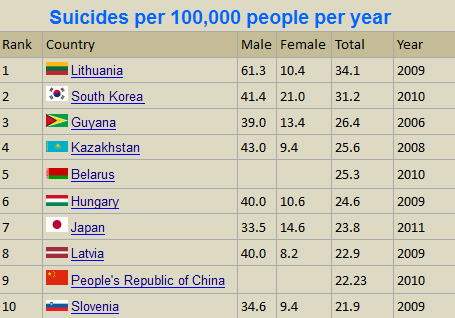
Other articles:
http://www.elnet.lt/psychoanalysis/psychoanalysis/Vilmos2.htm
http://eurpub.oxfordjournals.org/content/10/2/101.full.pdf
Sat, 24th March, 2012 - Posted by - (5) Comment
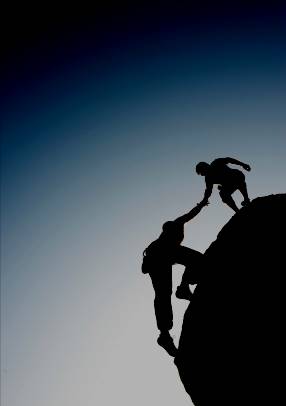
If you or someone you know is living with depression or bipolar disorder (also known as manic depression), you understand all too well that the symptoms may include feelings of sadness and hopelessness. These feelings can also include thoughts of self-harm or suicide. Whether we have suicidal thoughts ourselves, or know a severely depressed person who does, there are ways that we can respond with strength and courage.
Understanding Suicidal Thinking
The most important thing to remember about suicidal thoughts is that they are symptoms of a treatable illness associated with fluctuations in the body’s and brain’s chemistry. They are not character flaws or signs of personal weakness, nor are they conditions that will just "go away" on their own. Depression and the depressive phase of bipolar disorder may cause symptoms such as the following:
Taken together, these symptoms may lead someone to consider suicide. However, with proper treatment the majority of people do feel better and regain hope. Recovery is possible.
|
An article by the Depression and Bipolar Support Alliance (DBSA) |
Tue, 3rd January, 2012 - Posted by - (1) Comment
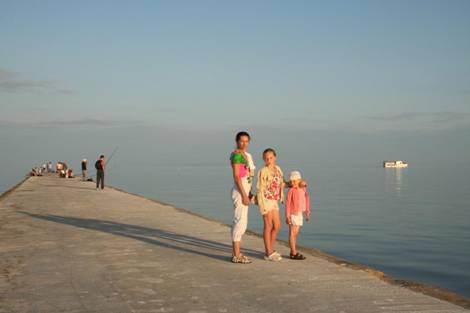
Text and photos: Aage Myhre
aage.myhre@VilNews.com
The quiet resort village Nida is based at the Curonian Spit (Neringa) near the Kaliningrad border, less than one hour’s drive from Klaipeda at Lithuania’s seacoast. With beautiful Baltic Sea beaches on the west side, the large Curonian Lagoon on the east side and the largest sand dunes of Northern Europe on the southern side, this is a truly unique place for a relaxed vacation. You should spend one or two weeks in a self catering fisherman's cottage or a few days in a guest house or hotel. Nida is the place to take it easy!
Here is what a visiting family wrote after their visit:
"We have never visited anywhere that had such a relaxing effect on us as the view from the sun clock on the Great Dune in Nida. The silky-smooth lagoon to one side of the golden spit and the sparkling waves of the Baltic Sea to the other side was breath-takingly beautiful. We did lots of walking, running and cycling including a walk along the Baltic Sea beach from west of Preila back to Nida”.
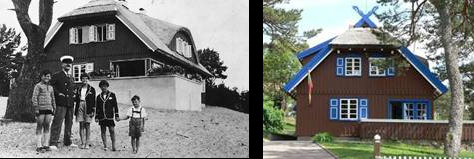
The Nida home of the German writer Thomas Mann,
today the Thomas Mann Museum.
Sun, 15th May, 2011 - Posted by - (7) Comment
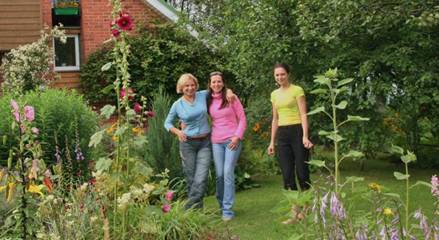
Many foreigners think that the majority of townspeople in Lithuania live in dreary grey Soviet blockhouses. They are right, but only to a certain extent. What most people in the West do not know, is that the Lithuanians and other peoples in Eastern Europe are living a double life. For while blockhouse apartments in the urban peripheries are the city dwellers habitat through the winter months, the gardens houses take over as the families' main homes once the snow is gone. These gardens are in Lithuanian language called a 'sodas' and the very garden house a 'sodo namas'.
Most garden houses are built on land plots just outside the cities. Most were built during the Soviet era, when many city dwellers were given free land by the authorities. This principle is well known in the west, as the so-called allotment gardening principle, but while it has a limited scope in the west, it is in this country and other East European countries very popular and widespread.
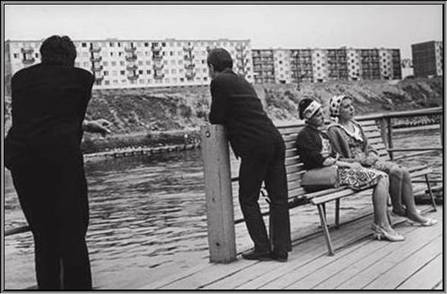
Sun, 1st May, 2011 - Posted by - (1) Comment


The International Women's Association of Vilnius and Roche Lietuva continue the battle against breast cancer
For the third year in a row a charity dinner has been organized to raise awareness and collect money.
All money collected from sponsors and from the dinner will be used to purchase biopsy needles which will then be donated to the main oncology hospitals in Klaipeda, Kaunas and Vilnius.
Breast cancer is one of the most common forms of cancer to affect women. While early diagnosis allows to dramatically increase survival rate, the percentage of breast cancer cases diagnosed at the late three and four stages is still high in Lithuania.
Last year's charity event 'Dancing through the Ages' raised more than 40,000 litas which was used to purchase the biopsy needles which are essential for early diagnosis.
For more information go to http://www.iwavilnius.com/blossom-of-hope.html
For sponsorship contact Barbara Little at barbsvilnius@gmail.com
VilNews e-magazine is published in Vilnius, Lithuania. Editor-in-Chief: Mr. Aage Myhre. Inquires to the editors: editor@VilNews.com.
Code of Ethics: See Section 2 – about VilNews. VilNews is not responsible for content on external links/web pages.
HOW TO ADVERTISE IN VILNEWS.
All content is copyrighted © 2011. UAB ‘VilNews’.